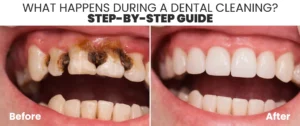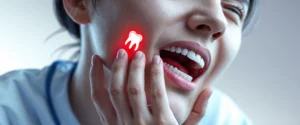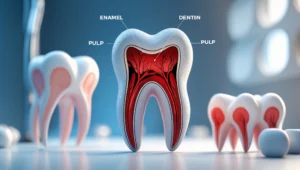Impacted teeth, a common dental issue, occur when a tooth fails to erupt properly through the gum. This can lead to various complications, necessitating oral surgery for correction. Understanding the signs and reasons behind impacted teeth is crucial for timely intervention and maintaining oral health.
Causes of Impacted Teeth
Teeth may become impacted when they are unable to erupt properly through the gum line. This can occur due to several reasons:
- Explanation of why teeth become impacted: Impaction often results from overcrowding in the jaw. When there isn’t enough space for teeth to grow in their correct positions, they may become trapped beneath the gums or emerge at awkward angles. Additionally, abnormal growth patterns, such as teeth growing in the wrong direction, can lead to impaction.
- Common reasons such as overcrowding or abnormal growth: Overcrowding is a primary cause of tooth impaction. It can happen when the jaw is too small to accommodate all the teeth trying to come in. Abnormal growth includes instances where teeth grow sideways, tilted, or blocked by other teeth or structures in the mouth.
Symptoms of Impacted Teeth
Recognizing the symptoms of impacted teeth is essential for timely treatment:
- Signs patients should watch for: Symptoms may include persistent pain or sensitivity around the impacted area, swelling of the gums, and difficulty opening the mouth fully. Some patients may notice bad breath or a foul taste due to trapped food particles and bacteria around the impacted tooth.
- Potential complications if untreated: If left untreated, impacted teeth can lead to more severe issues such as infection, damage to adjacent teeth, or cyst formation around the impacted tooth. In severe cases, untreated impaction can even affect the alignment of other teeth or cause bone loss in the jaw.
Diagnostic Methods for Impacted Teeth
Dentists in Parkland use various techniques to diagnose impacted teeth accurately:
- Techniques used by dentists to diagnose impacted teeth: Diagnosis typically begins with a thorough clinical examination where the dentist near you checks for signs of impaction, such as visible swelling or inflammation. X-rays are crucial in identifying impacted teeth that aren’t visible through visual inspection alone. Panoramic X-rays provide a comprehensive view of all teeth and their positioning within the jaw, helping dentists determine the exact location and orientation of impacted teeth.
- Importance of early detection through X-rays and clinical examination: Early detection allows dentists to develop a treatment plan before complications arise. By identifying impacted teeth early, dentists can recommend appropriate interventions, such as orthodontic adjustments to create more space or surgical removal of the impacted tooth to prevent future issues.
Indications for Oral Surgery
Oral surgery in Parkland may become necessary under specific conditions:
- Conditions under which oral surgery becomes necessary: Oral surgery for impacted teeth is typically recommended when the tooth is causing some pain, infection, or damage to neighboring teeth. If the impacted tooth is at risk of damaging adjacent teeth or causing misalignment due to its position, surgical intervention may be the best course of action.
- Criteria for deciding surgical intervention: Dentists consider several factors when determining if oral surgery is necessary, including the size and position of the impacted tooth, the patient’s age, overall dental health, and the presence of symptoms like pain or infection. Surgical extraction may be recommended if conservative treatments like orthodontic adjustments are unlikely to resolve the impaction.
Types of Oral Surgery for Impacted Teeth
Various surgical procedures are available to address impacted teeth:
- Different surgical procedures available: The type of oral surgery required depends on the position and orientation of the impacted tooth. Simple extractions involve removing the tooth directly from the gum line, whereas surgical extractions may require incisions in the gum tissue to access deeply impacted teeth. For impacted wisdom teeth or those located deep within the jawbone, surgical procedures may involve sectioning the tooth into smaller pieces for convenient removal.
- Each procedure’s purpose and approach: The goal of oral surgery for impacted teeth is to safely remove the affected tooth while preserving surrounding tissues and minimizing discomfort for the patient. Dentists may utilize local anesthesia or sedation to ensure patient comfort during the procedure, depending on the complexity of the extraction.
Risks and Complications of Oral Surgery
While generally safe, oral surgery for impacted teeth carries some risks:
- Potential risks associated with oral surgery: Common risks include temporary swelling and discomfort following the procedure, which can generally be managed with pain medications and cold compresses. Infection is a possible complication, although rare, which is why dentists prescribe antibiotics when necessary and provide detailed post-operative care instructions.
- How dentists mitigate risks and ensure patient safety: Dentists minimize risks by using sterile techniques, prescribing appropriate medications, and providing thorough post-operative instructions. Patients are advised to follow all aftercare guidelines, including keeping good oral hygiene and attending all follow-up appointments to monitor healing progress and promptly address concerns.
Recovery and Aftercare
Recovering from oral surgery for impacted teeth requires careful attention to post-operative instructions:
- Steps patients should take post-surgery: Immediately following surgery, patients should rest and avoid stressful activities to facilitate healing. Dentists may recommend a soft diet and gentle oral hygiene practices to prevent irritation to the surgical site.
- Importance of follow-up visits and care instructions: Follow-up visits allow dentists to monitor healing, remove stitches if necessary, and promptly address complications such as infection. Patients should continue practicing oral hygiene and attend scheduled appointments to ensure the surgical site heals properly.
Conclusion
Oral surgery for impacted teeth is necessary when conservative treatments are insufficient to address impaction-related symptoms or risks. Patients can make correct decisions about their oral health care by understanding the causes, symptoms, diagnostic methods, and types of oral surgery available. Early detection and timely intervention from a dental office near you can prevent complications and promote long-term oral health.
How Can Oral Surgery for Impacted Teeth Improve Your Smile?
If you’re experiencing symptoms of impacted teeth or have been advised to consider oral surgery, contact Daily Smiles – Parkland for expert evaluation and personalized treatment options. Dr. Michelle Gonzales and our dedicated team are committed to providing compassionate care and restoring your oral health.





